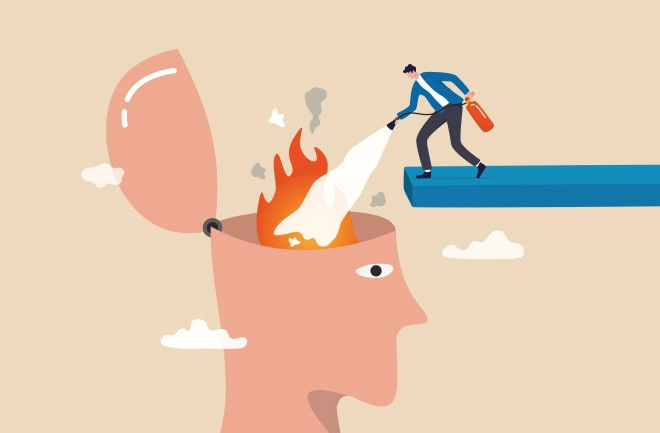Anger Management And Adrenaline
Knowing The Difference Between Anger And Adrenaline:
Anger is a characteristic close-to-home reaction that emerges when we see dangers, treacheries, or frustrations. A piece of our body’s endurance system has developed over the long haul to set us up for likely risk. At the point when our cerebrum detects danger or an uncalled-for circumstance, it flags the adrenal organs to deliver adrenaline into our circulatory system.
Adrenaline, frequently alluded to as the “survival” chemical, sets off a progression of physiological changes pointed toward setting up the body for activity. This incorporates expanding the pulse, siphoning more blood to the muscles, and helping the breathing rate. These progressions are intended to give an energy flood, improving our actual capacities to either go up against the danger or escape from it. This reaction can be exceptionally versatile in circumstances where prompt activity is expected to guarantee our security.
Overseeing anger management soundly is vital for relieving these adverse consequences. Procedures like care, profound breathing, exercise, and looking for proficient help can assist people with adapting to outrage and stress in a manner that doesn’t think twice about physical and emotional wellness. Figuring out how to perceive triggers, rehearsing unwinding methods, and taking on powerful correspondence techniques can likewise add to keeping a better profound equilibrium.
Finding a Balance Between Anger Control And Adrenaline:
Ongoing pressure is negative to both our physical and emotional wellness. The consistent arrival of adrenaline and other pressure chemicals can prompt:
Physical Wellbeing Issues: Delayed openness to push chemicals like adrenaline can add to expanded pulse, pulse, and aggravation. This, thus, can raise the gamble of cardiovascular issues, debilitate the resistant framework, and add to conditions like migraines, gastrointestinal issues, and muscle pressure.
Mental Wellbeing Challenges: Constant pressure from uncontrolled annoyance can add to the turn of events or worsen psychological well-being issues like uneasiness and wretchedness. It can likewise impede mental capabilities like navigation and memory.
Relationship Strain: Uncontrolled displeasure can strain associations with others, prompting clashes, seclusion, and decreased social help.
Behavioral Patterns: Constant pressure from outrage could prompt undesirable ways of dealing with stress, for example, indulging, substance misuse, or even forceful ways of behaving.
Emotional Well-being: The continuous pattern of outrage and stress can prompt a pessimistic close-to-home state, making it hard to encounter happiness, satisfaction, or a feeling of prosperity.
Healthy Anger Management Strategies:
Alleviating these results requires the development of viable annoyance the executive’s methods:
Mindfulness: Perceive triggers that lead to outrage and screen physiological reactions, including adrenaline discharge.
Care and Unwinding: Rehearsing care and unwinding activities can assist with diffusing displeasure and lessen unnecessary adrenaline discharge.
Correspondence: Foster confident yet aware relational abilities to communicate outrage without intensifying struggles.
Sound Outlets: Take part in proactive tasks, imaginative pursuits, or leisure activities to help channel energy.
Proficient Direction: Look for help from psychological wellness experts when outrage becomes overpowering and challenging to make due.

The Body’s Reaction to Prolonged Adrenaline Exposure:
These side effects are related to delayed openness to uplifted degrees of adrenaline, cortisol, cytokines, and receptors, setting off different responses in various organ frameworks. These side effects include:
Supported Pressure Reaction Impacts: Delayed openness to uplifted adrenaline, cortisol, cytokines, and receptors triggers responses in different organ frameworks. Side effects incorporate migraines, crabby inside, perspiring, chest torment, sleep deprivation, nervousness, OCD, loss of motion, and then some.
Complex Exchange of Pressure: Long-haul pressure upsets chemicals and insusceptible reactions, causing these side effects. The body’s “survival” reaction becomes constant, prompting these destructive impacts.
Relieving Through Equilibrium: It is urgent to Oversee ongoing pressure. Methods like pressure decrease, care, solid propensities, and expert assist with reestablishing harmony, diminishing the effect on physical and mental prosperity.
The Effects of Chronic Anger and Regular Adrenaline Release:
Chronic anger and regular adrenaline release might be harmful to our health. Physically, high levels of adrenaline can cause tense muscles, a faster heartbeat, and high blood pressure. This can eventually lead to heart issues, immune system issues, and even chronic pain concerns. Excessive rage and adrenaline can affect our emotional stability, causing impatience, anxiety, and problems focusing. It could also impede personal development and strain relationships.
Effective Anger Management Techniques:
The development of good coping mechanisms is crucial for controlling anger and adrenaline release. Here are some tactics that could be useful:
Identify Triggers: Recognise the circumstances, persons, or events that frequently make you angry. You can anticipate and be ready to handle anger by being aware of your triggers.
Practice Deep Breathing and Relaxation Techniques: Take slow, deep breaths to calm your body and lessen the release of adrenaline when you become angry. Practice deep breathing and relaxation techniques. Participating in relaxation exercises like progressive muscle relaxation, yoga, or meditation can also aid in managing anger and enhancing general well-being.
Cognitive Restructuring: Challenge your angry-related negative thought patterns and reframe them more constructively or realistically. This can aid in perspective-shifting and lessen the ferocity of furious feelings.
Communication and Assertiveness Skills: Developing your assertiveness and communication skills will help you express yourself without getting angry. Strong interpersonal skills can promote healthier relationships and lessen the things that make people angry.
Seek expert Assistance: If rage problems recur or seriously interfere with daily life, you might want to think about getting help from a mental health expert. To meet your unique needs, they can offer counseling and teach you other coping mechanisms.

Conclusion:
Although anger is a normal feeling, when it’s out of control or excessive, it can be harmful to our physical and mental health. These detrimental effects may be exacerbated by the release of adrenaline during rage. Anger management and adrenaline are related, thus by knowing this link, people may effectively control their emotional responses. People can be empowered to control their anger healthily and productively by putting into practice practices including recognizing triggers, practicing relaxation techniques, cognitive restructuring, strengthening communication skills, and getting professional assistance when necessary.
Like this project
Posted Sep 25, 2023
Essential Yoga Poses for beginners with an adding focus on health, awareness, and heartiness, yoga has surfaced as a popular and benefic form of exercise
Likes
0
Views
2



